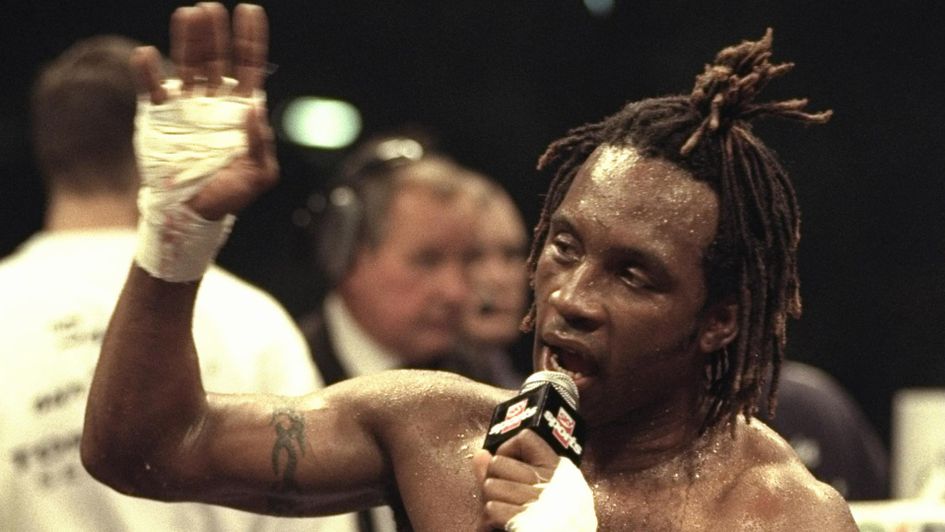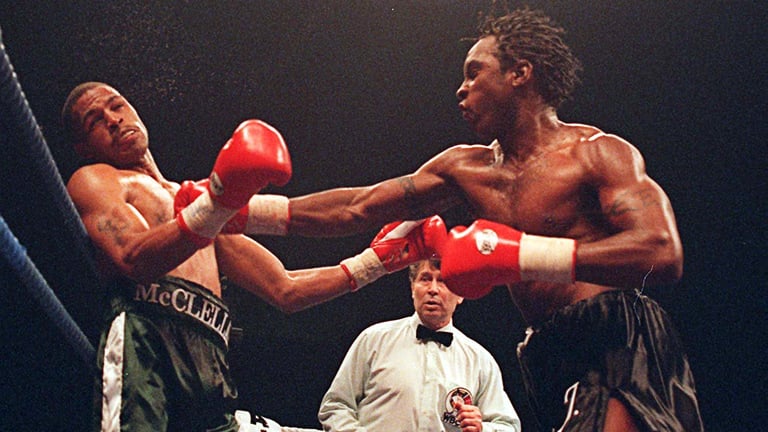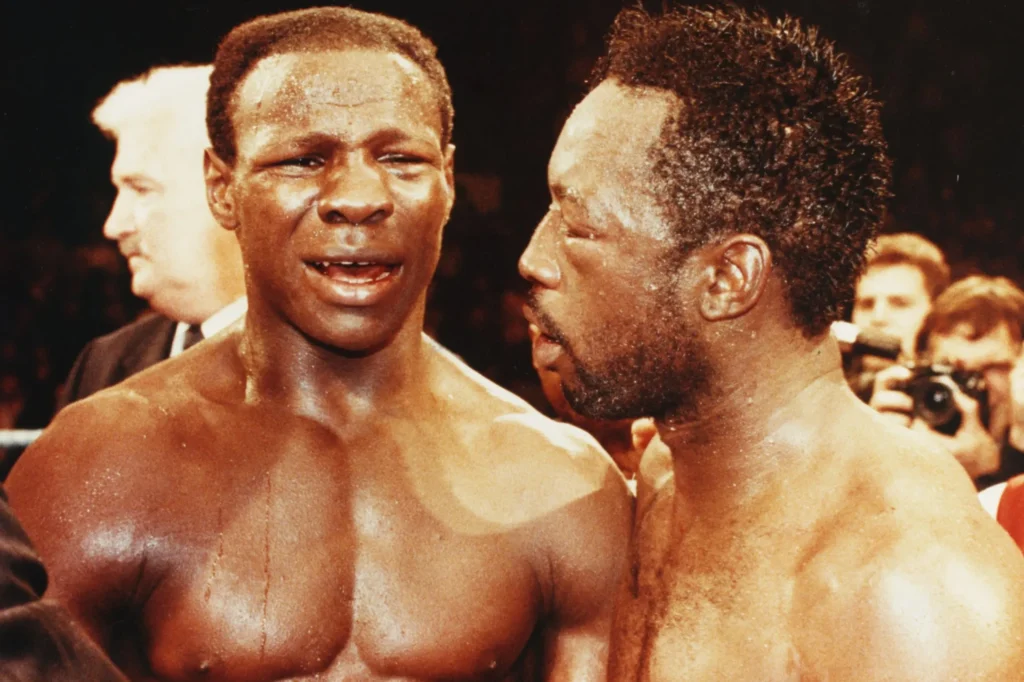Born: 22 January 1964 (age 60) Weight’s(middleweight, super-middleweight) Height 5 ft 9 in (177cm) Reach 73 in (185cm) Stance: Orthodox Boxing Record:48-5-1 (35KO)

Introduction to Nigel Benn
Nigel Benn’s journey from a humble beginning in Ilford, Essex, to becoming a boxing legend is a tale of resilience, hard work, and sheer determination. Born into a large family on January 22, 1964, Benn’s early exposure to the discipline of boxing came from his father, who was keen on instilling the virtues of hard work and perseverance in his youngest son. This early introduction to the sport ignited a passion in Benn that would shape the course of his life.
Growing up in a working-class neighborhood, Benn faced the myriad challenges that often accompany such environments. Instead of succumbing to the pressures and temptations around him, boxing became his refuge and a source of discipline. The sport offered Benn not just an escape but a purpose, channeling his energies into a constructive pursuit that promised a way out of the socioeconomic constraints of his upbringing.
The turning point in Benn’s early life came when he decided to join the British Army at the age of 18. The army’s rigorous discipline and physical training refined Benn’s raw talents and instilled in him a sense of responsibility and focus. It was during his tenure in the armed forces that Benn’s boxing skills truly flourished, earning him recognition and setting the stage for what would become a legendary career in professional boxing.
Benn’s transition from a troubled youth to a disciplined soldier and athlete is a narrative of transformation and hope. His early life story resonates with the power of sport as a means to overcome adversity, build character, and chase dreams with unwavering dedication. Nigel Benn’s rise from the streets of Essex to the pinnacle of boxing is not just a sports story but an inspiring account of personal triumph.
Professional Debut and Early Successes
Nigel Benn burst onto the professional boxing scene on January 28, 1987, with a formidable reputation honed from his amateur career and time spent in the British Army. His debut was a spectacle of raw power and aggression, as he knocked out his opponent in the first round, signaling the arrival of “The Dark Destroyer” in the professional ranks. This explosive start was a harbinger of what was to come; Benn racked up a series of wins, many by knockout, showcasing his devastating punching power and fearless fighting style. His early successes quickly elevated him from a promising newcomer to a serious contender in the middleweight division.
WBC Super Middleweight Champion: Nigel Benn’s Rise to Prominence
Nigel Benn, known as “The Dark Destroyer,” made significant strides in boxing, particularly when he won the WBC super middleweight title. His aggressive style and powerful punches quickly made him a fan favorite. Benn’s journey to becoming a champion was marked by his relentless pursuit of excellence and his ability to overcome tough opponents. This title not only solidified his reputation as a formidable fighter but also set the stage for some of the most iconic bouts in boxing history.
Benn Knocked World Champion: The Steve Collins Battles
Nigel Benn’s rivalry with Steve Collins was one of the most enthralling chapters of his career. Collins, a skilled and strategic fighter, was known for his mental and physical toughness. Their matches were highly anticipated, drawing large crowds and significant media attention. Although Benn was a fierce competitor, Collins proved to be a challenging adversary, showcasing the intensity and drama of top-tier boxing.
Benn Suffered: The Atlantic City Challenge Against Iran Barkley
One of Nigel Benn’s most memorable fights took place in Atlantic City, where he faced the rugged and experienced Iran Barkley. This bout was crucial for Benn to establish himself in the American market. The fight was intense from the start, with both fighters exchanging heavy blows. Benn displayed his characteristic power and resilience, which were tested thoroughly by Barkley’s robust fighting style.
Second Round Triumph: Two Knockdowns That Shocked the Audience
A highlight of Nigel Benn’s career occurred during a spectacular match where he achieved two knockdowns in just the second round. This impressive feat demonstrated his exceptional power and speed, leaving the audience in awe and his opponent struggling to recover. Such performances helped cement Benn’s status not just as a powerful fighter but as a strategic and dominant force in the ring.
Each title bout and rivalry added layers to Nigel Benn’s storied career, contributing to his legacy as one of the most exciting and powerful boxers of his time.
Defining Fights
Benn’s career is punctuated with defining fights that not only showcased his skill and heart but also his ability to rise to the occasion against formidable opponents. One such encounter was his 1990 bout against Doug DeWitt for the WBO Middleweight title. Benn overcame early adversity to secure a knockout victory, claiming his first world title and solidifying his place among the elite fighters of his era. Another landmark fight was against Iran Barkley later that year, where Benn successfully defended his title with a first-round knockout, further proving his dominance in the division.
However, it was his fierce rivalry with Chris Eubank that truly defined Benn’s career. Their first meeting in 1990 was a brutal affair that ended with Benn suffering his first professional defeat. This setback, however, was not the end but rather a pivotal moment that showcased Benn’s resilience. Their rematch in 1993, for the WBC super-middleweight title, ended in a draw but remains one of the most memorable fights in British boxing history, epitomizing the era and the warrior spirit of Nigel Benn.
World Championships and Titles
Nigel Benn’s career was distinguished by his achievements at the world championship level. After winning the WBO Middleweight title, Benn moved up to the super-middleweight division, where he continued his dominance. He won the WBC Super-Middleweight title in 1992, a crown he defended multiple times against top contenders, showcasing his adaptability and enduring competitiveness. Benn’s reign in the super-middleweight division was marked by memorable defenses, including victories over Mauro Galvano and Gerald McClellan, the latter being a particularly poignant and hard-fought win that underscored Benn’s bravery and resilience.
Nigel Benn’s boxing career is a chronicle of determination, skill, and the relentless pursuit of greatness. His professional debut, defining fights, and accumulation of world titles reflect not just his physical abilities but also his mental fortitude and warrior spirit. Through the highs and lows of his career, Benn remained a compelling figure in boxing, admired for his prowess in the ring and his unwavering spirit in the face of adversity.

Fighting Style and Techniques
Benn’s fighting style was a blend of raw power, aggression, and resilience. He was renowned for his devastating punching power, particularly his right hand, which he could deliver with both speed and precision. Benn’s approach was to overwhelm his opponents with sheer force, often leading to early knockouts in his bouts. However, beyond his power, Benn possessed a solid chin and remarkable heart, often battling through adversity to secure victory.
His technique was not just about aggression; Benn adapted his style over the years to become more measured and strategic in his approach, especially in the latter stages of his career. He incorporated better defense, movement, and counter-punching abilities, which allowed him to compete at the highest level well into his career. Benn’s ability to evolve as a fighter demonstrated his understanding of the sport and his dedication to excellence.
Legacy in Boxing
Nigel Benn’s legacy in boxing is multifaceted. He is remembered as one of the most exciting fighters of his era, someone who guaranteed action every time he stepped into the ring. His battles, particularly those against Chris Eubank and Gerald McClellan, are etched in boxing history for their intensity, bravery, and the heart displayed by all involved. Benn’s career is a testament to the highs and lows of professional boxing, showcasing the glory of championship victories and the challenges of coming back from defeats.
Moreover, Benn’s impact transcends his fight record. He played a pivotal role in elevating British boxing during the 1990s, participating in some of the most significant and memorable domestic bouts of the time. His rivalries helped revive interest in the sport within the UK, contributing to a resurgence of boxing as a major sporting attraction.
Influence on Future Generations
The influence of Nigel Benn on future generations of boxers is profound. His courage, work ethic, and resilience serve as inspiration for aspiring fighters, demonstrating the virtues of perseverance, dedication, and the importance of evolving as an athlete. Benn’s story, from his humble beginnings to becoming a world champion, resonates with young boxers, emphasizing that success is achievable with hard work and determination.
Furthermore, Benn’s openness about his struggles, both inside and outside the ring, has encouraged a more holistic approach to the sport, where mental health and personal well-being are considered as vital as physical fitness. This legacy of openness and resilience continues to inspire not just boxers but athletes across various disciplines.
Nigel Benn’s contribution to boxing is enduring. As “The Dark Destroyer,” he thrilled fans with his dynamism and power. As a legacy, he leaves behind a narrative of triumph, redemption, and the relentless pursuit of greatness, influencing not only the tactics and strategies of fighters who follow in his footsteps but also their approach to life’s challenges.
The Benn vs. Eubank rivalry remains a defining chapter in the history of British boxing, remembered for the passion, drama, and excellence it brought to the ring. Its legacy continues to influence the sport in the UK, serving as a reminder of the power of boxing to captivate and inspire.
The Rivalry Explained

The animosity between Benn and Eubank was both intense and personal, stemming from their contrasting personalities and boxing styles. Benn, “The Dark Destroyer,” was known for his aggressive, power-punching approach, embodying the spirit of a warrior ready to engage in a brawl. In contrast, Chris Eubank, with his eccentric personality and unorthodox fighting style, prided himself on his intelligence, defense, and precision. The stark differences between the two fighters fueled a rivalry that captured the imagination of boxing fans worldwide.
Their disdain for each other was not just for show; it was deeply rooted, with both men eager to prove their dominance over the other. This intense rivalry was not only about winning titles but also about personal pride and legacy.
Analysis of Their Fights
Benn and Eubank first clashed on November 18, 1990, in a fight that had been eagerly anticipated by fans and pundits alike. The bout was a brutal affair, with both fighters trading heavy blows from the start. Benn sought to overpower Eubank with his ferocity and strength, while Eubank aimed to outsmart and outbox Benn with his defensive skills and counter-punching. Eubank ultimately emerged victorious, stopping Benn in the ninth round to claim the WBO middleweight title. The fight was a classic encounter that lived up to the hype, showcasing the contrasting styles and sheer determination of both men.
Their rematch on October 9, 1993, for the WBC super-middleweight title, was equally anticipated and ended in a controversial draw. Many fans and commentators felt the decision did not reflect the intense, back-and-forth nature of the bout, which saw both fighters have moments of dominance. Regardless of the outcome, the rematch solidified the rivalry’s place in boxing lore, demonstrating both fighters’ growth and adaptation since their first encounter.
Impact on British Boxing
The rivalry between Benn and Eubank had a profound impact on British boxing, elevating the sport’s profile in the UK to unprecedented heights. Their battles were not just boxing matches; they were major sporting events that captured the nation’s attention, drawing in casual fans and seasoned aficionados alike. The intense interest in their fights contributed to a golden era for British boxing, with increased media coverage, sponsorship, and public engagement.
Moreover, the rivalry helped pave the way for future British boxers, setting a benchmark for what was possible in terms of domestic and international success. It showcased the potential for British boxing to produce compelling narratives and world-class talent, inspiring a generation of fighters to pursue the sport with dreams of achieving similar fame and acclaim.
Epic Battles
Among the numerous thrilling encounters in Benn’s career, his bouts against Gerald McClellan and Chris Eubank stand out for their sheer intensity and drama. The fight against Gerald McClellan on February 25, 1995, for the WBC super-middleweight title, is often cited as one of the most brutal and compelling matches in boxing history. McClellan was a formidable opponent, known for his knockout power, but Benn, true to his warrior ethos, engaged in a fierce battle that pushed both fighters to their limits. Despite being knocked down early in the fight, Benn mounted a heroic comeback, eventually leading to a tragic outcome for McClellan. This fight underscored Benn’s resilience and heart, albeit at a high cost.
Comeback Fights
Benn’s career was also characterized by his ability to bounce back from adversity. After his first professional loss to Michael Watson and subsequent defeat to Chris Eubank, many doubted whether Benn could reclaim his status at the top of the sport. However, Benn’s indomitable spirit shone through in his comeback fights. Notably, his victory against Doug DeWitt to claim the WBO middleweight title showcased his improved skill set and mental fortitude, proving his critics wrong and reaffirming his position as one of the world’s best middleweight fighters.
Legacy Matches
The rivalry with Chris Eubank, particularly their first encounter in 1990 and the rematch in 1993, are legacy matches that defined Benn’s career. These bouts transcended the sport, capturing the public’s imagination and drawing unprecedented attention to British boxing. The first fight with Eubank, which resulted in Benn’s loss, was a pivotal moment that tested his resolve. The subsequent draw in their rematch, though controversial, displayed Benn’s growth as a fighter and his undying commitment to the sport. These encounters are not just memorable for their in-ring action but for the way they encapsulated an era of British boxing, highlighting the sport’s drama, competitiveness, and the thin line between triumph and despair.
Nigel Benn’s memorable matches—his epic battles, comeback fights, and legacy-defining encounters—illustrate the depth of his character and the breadth of his achievements. They speak to a career that was as much about overcoming personal and professional challenges as it was about the victories and titles. Through these matches, Benn’s legacy as a fighter who embodied the spirit of determination and resilience is cemented in the annals of boxing history.
FAQ’S
What made Nigel Benn a standout boxer in his era? Nigel Benn, known as “The Dark Destroyer,” was renowned for his aggressive fighting style, exceptional power, and resilience in the ring. His ability to engage in epic battles and deliver stunning knockouts made him a standout boxer of his era, captivating fans with his heart and determination.
How did Nigel Benn’s military background influence his boxing career? Benn’s military background instilled in him discipline, physical fitness, and mental toughness, which played a significant role in shaping his approach to boxing. The rigorous training and discipline he experienced in the British Army contributed to his resilience and work ethic, both key attributes in his successful boxing career.
What was the significance of the Nigel Benn vs. Chris Eubank rivalry? The rivalry between Nigel Benn and Chris Eubank was significant for its intensity, the contrasting styles of the boxers, and its impact on British boxing. Their epic battles in the early 1990s captivated the nation, elevating the profile of the sport in the UK and leaving a lasting legacy on British boxing.
Can you describe one of Nigel Benn’s most memorable comeback fights? One of Benn’s most memorable comeback fights was against Gerald McClellan in 1995 for the WBC super middleweight title. Despite being knocked down and facing intense pressure, Benn showed incredible heart and resilience to fight back and win by knockout in the tenth round, in what is considered one of the most dramatic and poignant bouts in boxing history.
What are some of Nigel Benn’s legacy matches? Nigel Benn’s legacy matches include his bouts against Chris Eubank, Gerald McClellan, and his victories to claim the WBO middleweight and WBC super middleweight titles. These fights showcased his skill, determination, and the warrior spirit that defined his career, contributing to his lasting legacy in the sport.
How has Nigel Benn influenced future generations of boxers? Benn’s influence on future generations of boxers lies in his demonstration of courage, perseverance, and the importance of evolving as a fighter. His career, marked by memorable battles and overcoming adversity, serves as inspiration for aspiring boxers to pursue greatness with determination and resilience.
What has Nigel Benn done since retiring from boxing? Since retiring, Nigel Benn has focused on his family, personal well-being, and sharing his experiences through motivational speaking. He has also been involved in charity work and mentoring young boxers, using his platform to give back to the community and the sport that defined his career.